BA Business Studies: Unilever's Business Environment Analysis Report
VerifiedAdded on 2023/01/12
|12
|3493
|38
Report
AI Summary
This report provides a comprehensive analysis of Unilever's business environment, examining both macro and micro environmental factors that influence its operations and performance. The report begins with an introduction and company background, followed by a literature review that explores the impact of economic factors like economic systems, policies, and conditions, as well as non-economic factors such as demographics, natural resources, and culture, on organizational behavior. The analysis incorporates SWOT and PESTLE analyses to evaluate Unilever's internal and external environments, identifying strengths, weaknesses, opportunities, and threats. The discussion highlights the effects of Brexit, economic policies, and demographic shifts on Unilever's strategies. The report concludes by summarizing key findings and providing references, offering insights into how Unilever navigates and adapts to its dynamic business environment to maintain its market position and achieve sustained growth.
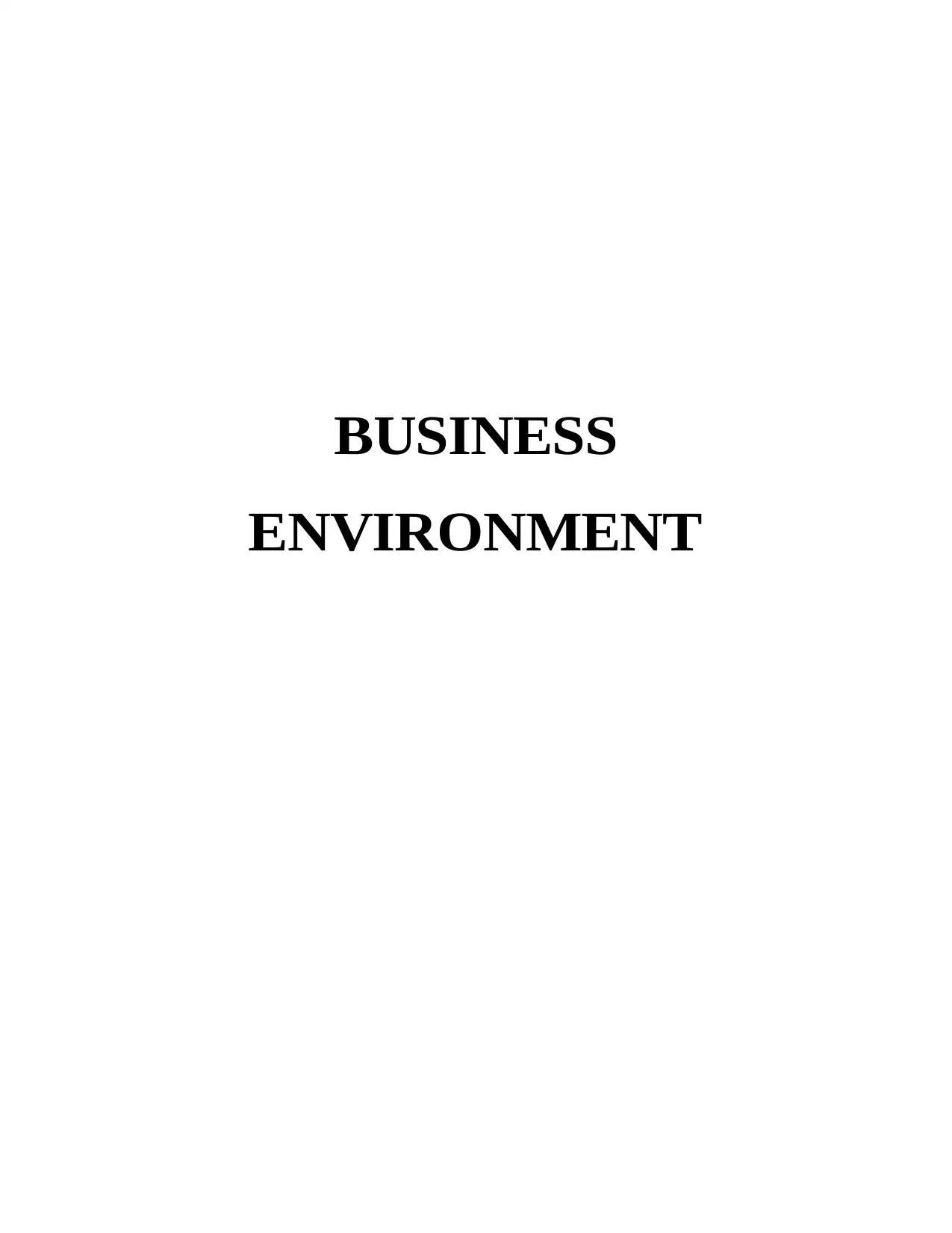
BUSINESS
ENVIRONMENT
ENVIRONMENT
Paraphrase This Document
Need a fresh take? Get an instant paraphrase of this document with our AI Paraphraser
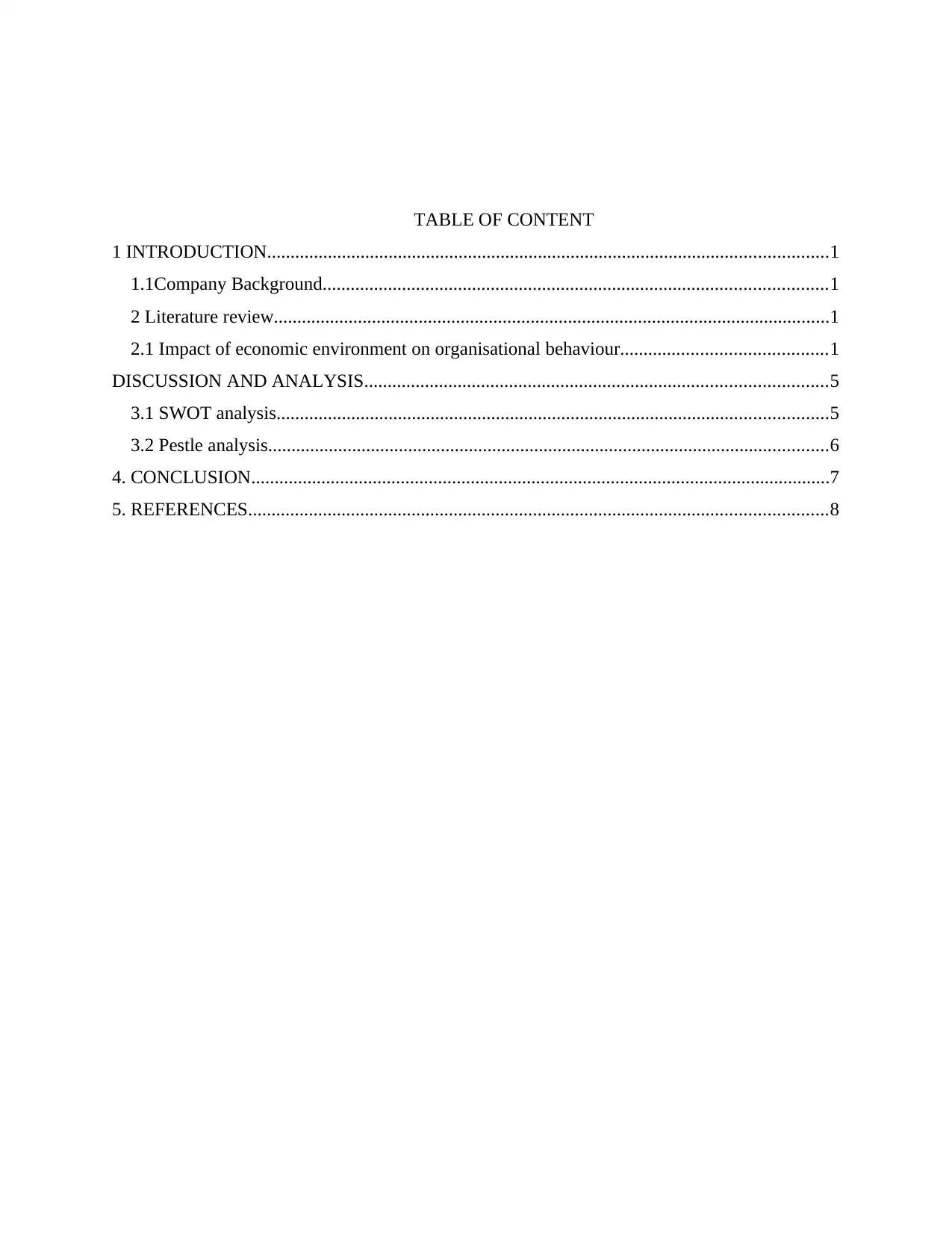
TABLE OF CONTENT
1 INTRODUCTION........................................................................................................................1
1.1Company Background............................................................................................................1
2 Literature review.......................................................................................................................1
2.1 Impact of economic environment on organisational behaviour............................................1
DISCUSSION AND ANALYSIS...................................................................................................5
3.1 SWOT analysis......................................................................................................................5
3.2 Pestle analysis........................................................................................................................6
4. CONCLUSION............................................................................................................................7
5. REFERENCES............................................................................................................................8
1 INTRODUCTION........................................................................................................................1
1.1Company Background............................................................................................................1
2 Literature review.......................................................................................................................1
2.1 Impact of economic environment on organisational behaviour............................................1
DISCUSSION AND ANALYSIS...................................................................................................5
3.1 SWOT analysis......................................................................................................................5
3.2 Pestle analysis........................................................................................................................6
4. CONCLUSION............................................................................................................................7
5. REFERENCES............................................................................................................................8
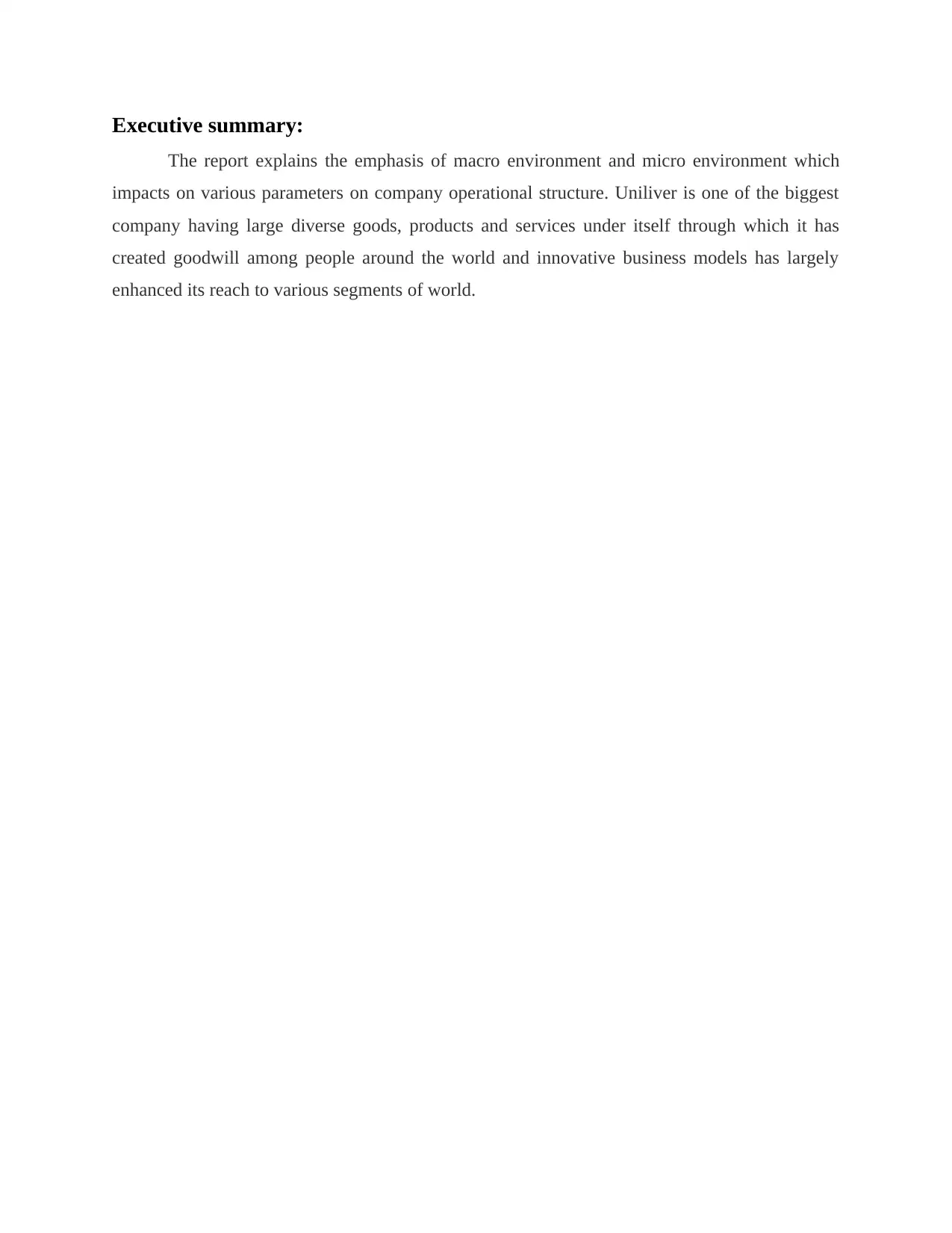
Executive summary:
The report explains the emphasis of macro environment and micro environment which
impacts on various parameters on company operational structure. Uniliver is one of the biggest
company having large diverse goods, products and services under itself through which it has
created goodwill among people around the world and innovative business models has largely
enhanced its reach to various segments of world.
The report explains the emphasis of macro environment and micro environment which
impacts on various parameters on company operational structure. Uniliver is one of the biggest
company having large diverse goods, products and services under itself through which it has
created goodwill among people around the world and innovative business models has largely
enhanced its reach to various segments of world.
⊘ This is a preview!⊘
Do you want full access?
Subscribe today to unlock all pages.

Trusted by 1+ million students worldwide
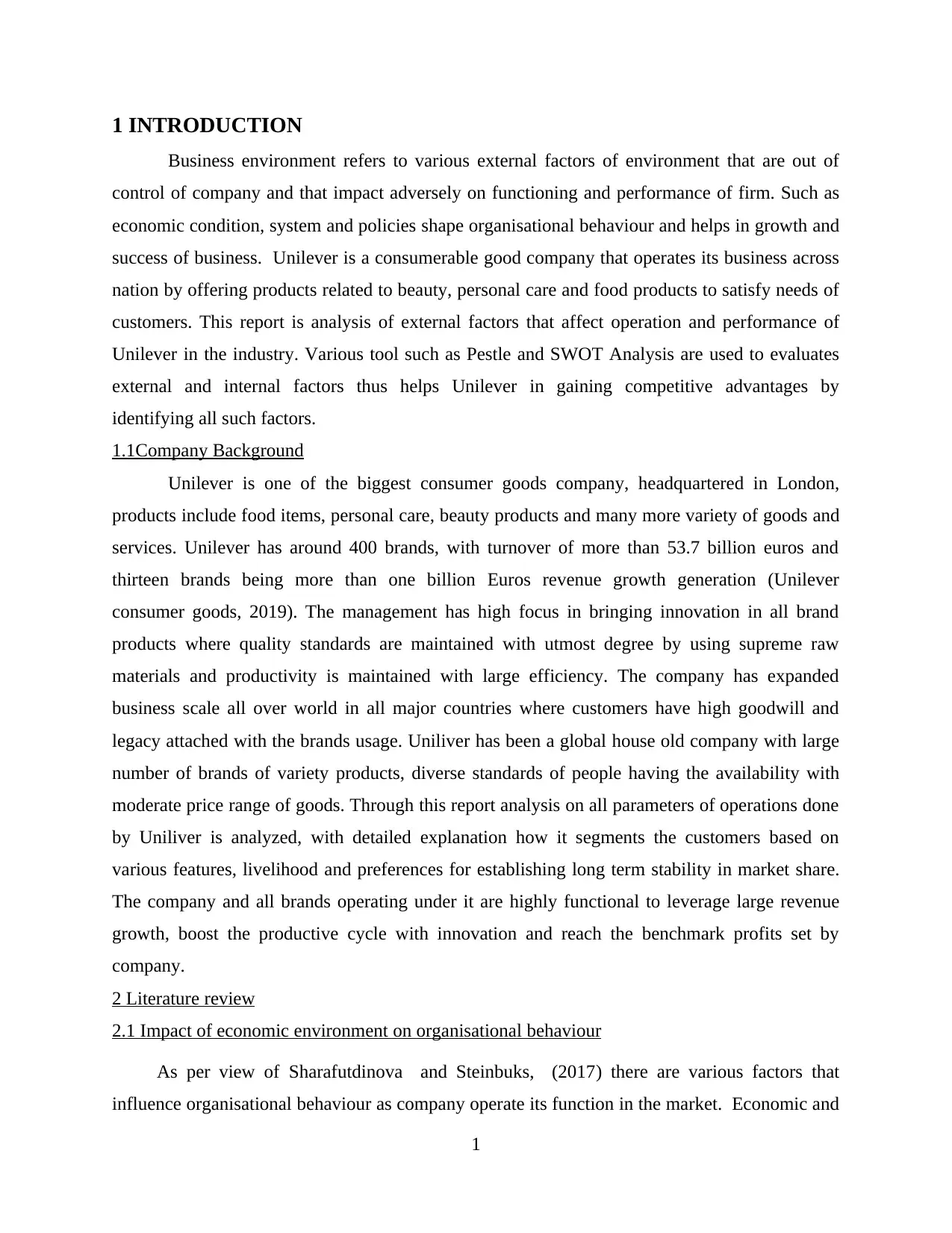
1 INTRODUCTION
Business environment refers to various external factors of environment that are out of
control of company and that impact adversely on functioning and performance of firm. Such as
economic condition, system and policies shape organisational behaviour and helps in growth and
success of business. Unilever is a consumerable good company that operates its business across
nation by offering products related to beauty, personal care and food products to satisfy needs of
customers. This report is analysis of external factors that affect operation and performance of
Unilever in the industry. Various tool such as Pestle and SWOT Analysis are used to evaluates
external and internal factors thus helps Unilever in gaining competitive advantages by
identifying all such factors.
1.1Company Background
Unilever is one of the biggest consumer goods company, headquartered in London,
products include food items, personal care, beauty products and many more variety of goods and
services. Unilever has around 400 brands, with turnover of more than 53.7 billion euros and
thirteen brands being more than one billion Euros revenue growth generation (Unilever
consumer goods, 2019). The management has high focus in bringing innovation in all brand
products where quality standards are maintained with utmost degree by using supreme raw
materials and productivity is maintained with large efficiency. The company has expanded
business scale all over world in all major countries where customers have high goodwill and
legacy attached with the brands usage. Uniliver has been a global house old company with large
number of brands of variety products, diverse standards of people having the availability with
moderate price range of goods. Through this report analysis on all parameters of operations done
by Uniliver is analyzed, with detailed explanation how it segments the customers based on
various features, livelihood and preferences for establishing long term stability in market share.
The company and all brands operating under it are highly functional to leverage large revenue
growth, boost the productive cycle with innovation and reach the benchmark profits set by
company.
2 Literature review
2.1 Impact of economic environment on organisational behaviour
As per view of Sharafutdinova and Steinbuks, (2017) there are various factors that
influence organisational behaviour as company operate its function in the market. Economic and
1
Business environment refers to various external factors of environment that are out of
control of company and that impact adversely on functioning and performance of firm. Such as
economic condition, system and policies shape organisational behaviour and helps in growth and
success of business. Unilever is a consumerable good company that operates its business across
nation by offering products related to beauty, personal care and food products to satisfy needs of
customers. This report is analysis of external factors that affect operation and performance of
Unilever in the industry. Various tool such as Pestle and SWOT Analysis are used to evaluates
external and internal factors thus helps Unilever in gaining competitive advantages by
identifying all such factors.
1.1Company Background
Unilever is one of the biggest consumer goods company, headquartered in London,
products include food items, personal care, beauty products and many more variety of goods and
services. Unilever has around 400 brands, with turnover of more than 53.7 billion euros and
thirteen brands being more than one billion Euros revenue growth generation (Unilever
consumer goods, 2019). The management has high focus in bringing innovation in all brand
products where quality standards are maintained with utmost degree by using supreme raw
materials and productivity is maintained with large efficiency. The company has expanded
business scale all over world in all major countries where customers have high goodwill and
legacy attached with the brands usage. Uniliver has been a global house old company with large
number of brands of variety products, diverse standards of people having the availability with
moderate price range of goods. Through this report analysis on all parameters of operations done
by Uniliver is analyzed, with detailed explanation how it segments the customers based on
various features, livelihood and preferences for establishing long term stability in market share.
The company and all brands operating under it are highly functional to leverage large revenue
growth, boost the productive cycle with innovation and reach the benchmark profits set by
company.
2 Literature review
2.1 Impact of economic environment on organisational behaviour
As per view of Sharafutdinova and Steinbuks, (2017) there are various factors that
influence organisational behaviour as company operate its function in the market. Economic and
1
Paraphrase This Document
Need a fresh take? Get an instant paraphrase of this document with our AI Paraphraser
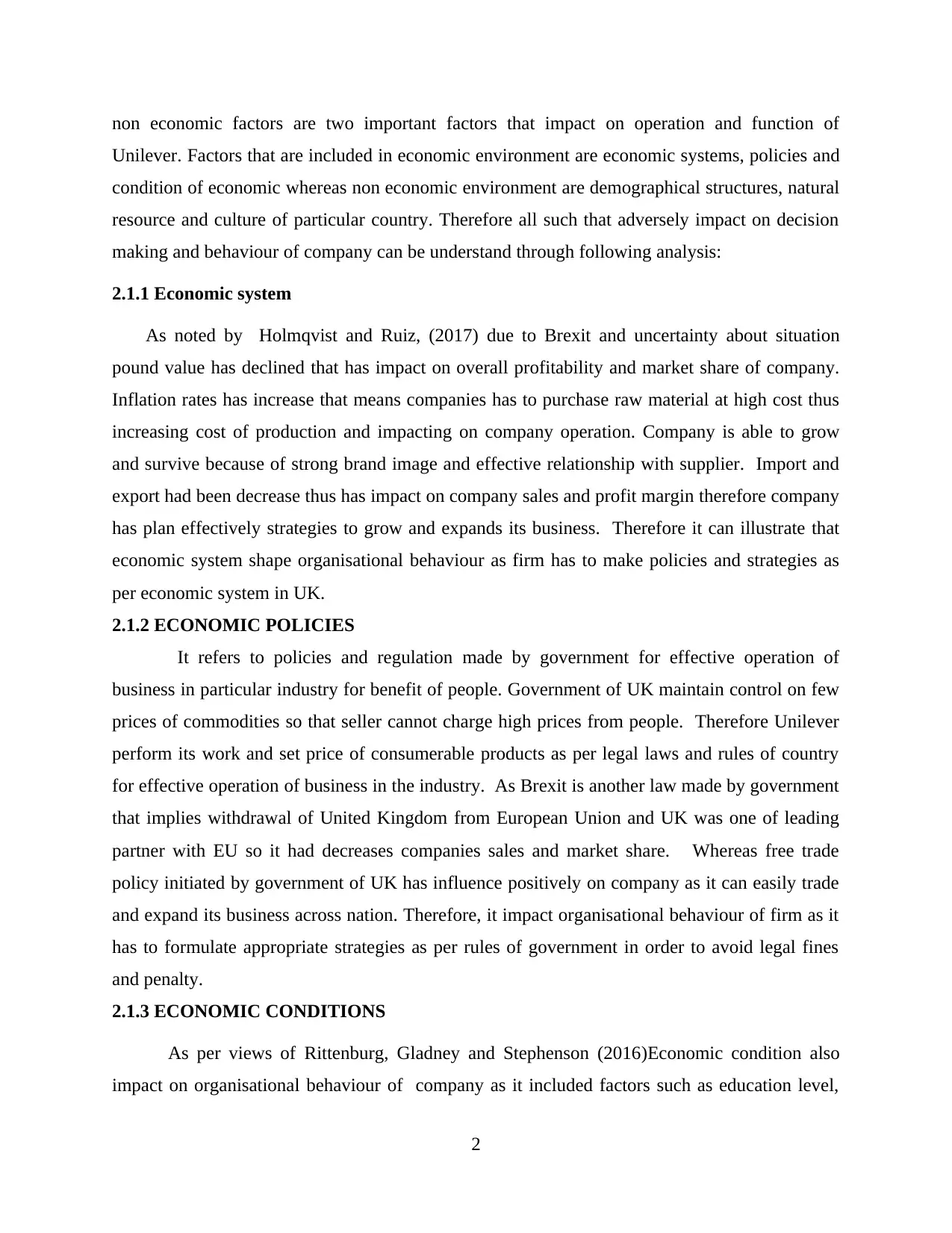
non economic factors are two important factors that impact on operation and function of
Unilever. Factors that are included in economic environment are economic systems, policies and
condition of economic whereas non economic environment are demographical structures, natural
resource and culture of particular country. Therefore all such that adversely impact on decision
making and behaviour of company can be understand through following analysis:
2.1.1 Economic system
As noted by Holmqvist and Ruiz, (2017) due to Brexit and uncertainty about situation
pound value has declined that has impact on overall profitability and market share of company.
Inflation rates has increase that means companies has to purchase raw material at high cost thus
increasing cost of production and impacting on company operation. Company is able to grow
and survive because of strong brand image and effective relationship with supplier. Import and
export had been decrease thus has impact on company sales and profit margin therefore company
has plan effectively strategies to grow and expands its business. Therefore it can illustrate that
economic system shape organisational behaviour as firm has to make policies and strategies as
per economic system in UK.
2.1.2 ECONOMIC POLICIES
It refers to policies and regulation made by government for effective operation of
business in particular industry for benefit of people. Government of UK maintain control on few
prices of commodities so that seller cannot charge high prices from people. Therefore Unilever
perform its work and set price of consumerable products as per legal laws and rules of country
for effective operation of business in the industry. As Brexit is another law made by government
that implies withdrawal of United Kingdom from European Union and UK was one of leading
partner with EU so it had decreases companies sales and market share. Whereas free trade
policy initiated by government of UK has influence positively on company as it can easily trade
and expand its business across nation. Therefore, it impact organisational behaviour of firm as it
has to formulate appropriate strategies as per rules of government in order to avoid legal fines
and penalty.
2.1.3 ECONOMIC CONDITIONS
As per views of Rittenburg, Gladney and Stephenson (2016)Economic condition also
impact on organisational behaviour of company as it included factors such as education level,
2
Unilever. Factors that are included in economic environment are economic systems, policies and
condition of economic whereas non economic environment are demographical structures, natural
resource and culture of particular country. Therefore all such that adversely impact on decision
making and behaviour of company can be understand through following analysis:
2.1.1 Economic system
As noted by Holmqvist and Ruiz, (2017) due to Brexit and uncertainty about situation
pound value has declined that has impact on overall profitability and market share of company.
Inflation rates has increase that means companies has to purchase raw material at high cost thus
increasing cost of production and impacting on company operation. Company is able to grow
and survive because of strong brand image and effective relationship with supplier. Import and
export had been decrease thus has impact on company sales and profit margin therefore company
has plan effectively strategies to grow and expands its business. Therefore it can illustrate that
economic system shape organisational behaviour as firm has to make policies and strategies as
per economic system in UK.
2.1.2 ECONOMIC POLICIES
It refers to policies and regulation made by government for effective operation of
business in particular industry for benefit of people. Government of UK maintain control on few
prices of commodities so that seller cannot charge high prices from people. Therefore Unilever
perform its work and set price of consumerable products as per legal laws and rules of country
for effective operation of business in the industry. As Brexit is another law made by government
that implies withdrawal of United Kingdom from European Union and UK was one of leading
partner with EU so it had decreases companies sales and market share. Whereas free trade
policy initiated by government of UK has influence positively on company as it can easily trade
and expand its business across nation. Therefore, it impact organisational behaviour of firm as it
has to formulate appropriate strategies as per rules of government in order to avoid legal fines
and penalty.
2.1.3 ECONOMIC CONDITIONS
As per views of Rittenburg, Gladney and Stephenson (2016)Economic condition also
impact on organisational behaviour of company as it included factors such as education level,
2
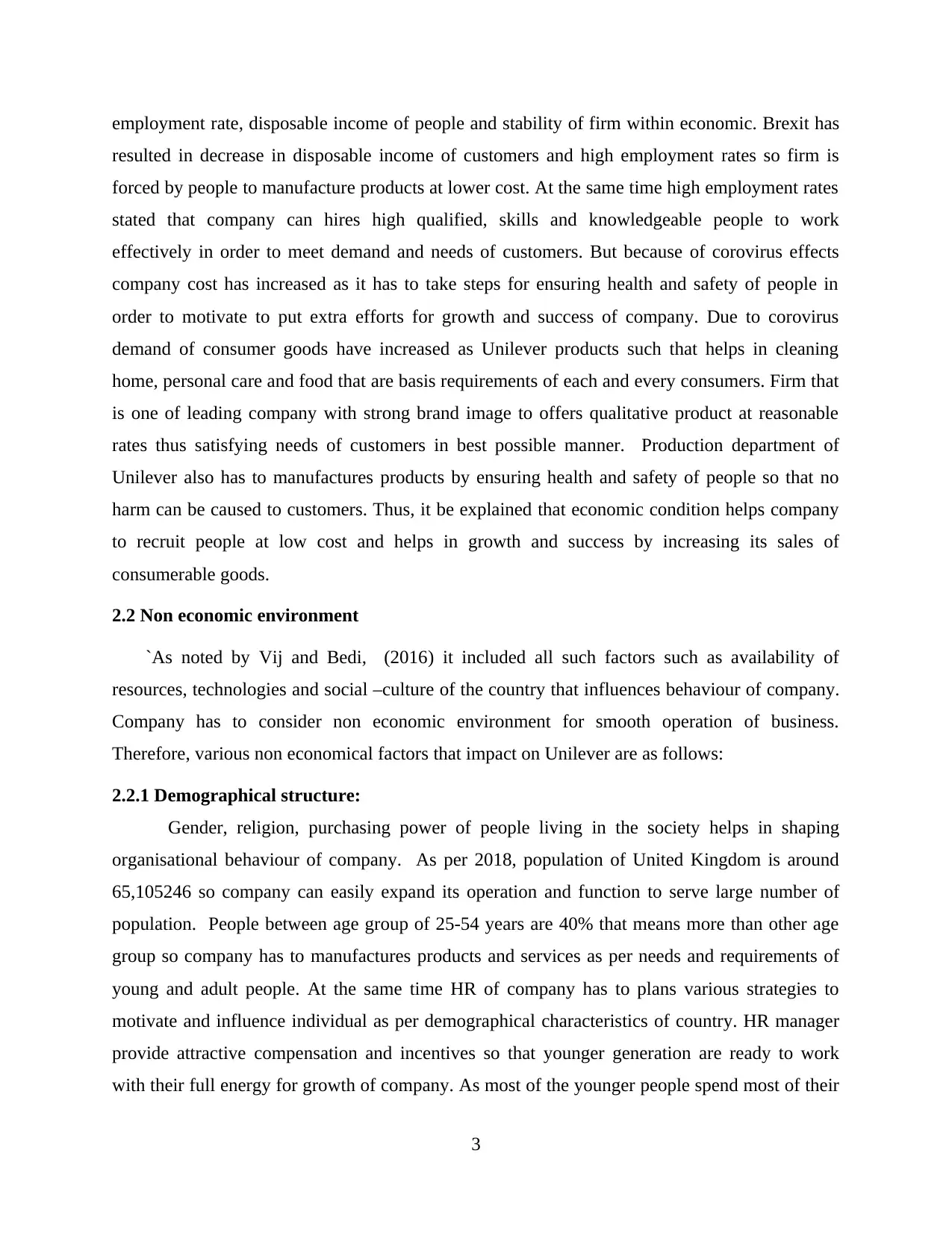
employment rate, disposable income of people and stability of firm within economic. Brexit has
resulted in decrease in disposable income of customers and high employment rates so firm is
forced by people to manufacture products at lower cost. At the same time high employment rates
stated that company can hires high qualified, skills and knowledgeable people to work
effectively in order to meet demand and needs of customers. But because of corovirus effects
company cost has increased as it has to take steps for ensuring health and safety of people in
order to motivate to put extra efforts for growth and success of company. Due to corovirus
demand of consumer goods have increased as Unilever products such that helps in cleaning
home, personal care and food that are basis requirements of each and every consumers. Firm that
is one of leading company with strong brand image to offers qualitative product at reasonable
rates thus satisfying needs of customers in best possible manner. Production department of
Unilever also has to manufactures products by ensuring health and safety of people so that no
harm can be caused to customers. Thus, it be explained that economic condition helps company
to recruit people at low cost and helps in growth and success by increasing its sales of
consumerable goods.
2.2 Non economic environment
`As noted by Vij and Bedi, (2016) it included all such factors such as availability of
resources, technologies and social –culture of the country that influences behaviour of company.
Company has to consider non economic environment for smooth operation of business.
Therefore, various non economical factors that impact on Unilever are as follows:
2.2.1 Demographical structure:
Gender, religion, purchasing power of people living in the society helps in shaping
organisational behaviour of company. As per 2018, population of United Kingdom is around
65,105246 so company can easily expand its operation and function to serve large number of
population. People between age group of 25-54 years are 40% that means more than other age
group so company has to manufactures products and services as per needs and requirements of
young and adult people. At the same time HR of company has to plans various strategies to
motivate and influence individual as per demographical characteristics of country. HR manager
provide attractive compensation and incentives so that younger generation are ready to work
with their full energy for growth of company. As most of the younger people spend most of their
3
resulted in decrease in disposable income of customers and high employment rates so firm is
forced by people to manufacture products at lower cost. At the same time high employment rates
stated that company can hires high qualified, skills and knowledgeable people to work
effectively in order to meet demand and needs of customers. But because of corovirus effects
company cost has increased as it has to take steps for ensuring health and safety of people in
order to motivate to put extra efforts for growth and success of company. Due to corovirus
demand of consumer goods have increased as Unilever products such that helps in cleaning
home, personal care and food that are basis requirements of each and every consumers. Firm that
is one of leading company with strong brand image to offers qualitative product at reasonable
rates thus satisfying needs of customers in best possible manner. Production department of
Unilever also has to manufactures products by ensuring health and safety of people so that no
harm can be caused to customers. Thus, it be explained that economic condition helps company
to recruit people at low cost and helps in growth and success by increasing its sales of
consumerable goods.
2.2 Non economic environment
`As noted by Vij and Bedi, (2016) it included all such factors such as availability of
resources, technologies and social –culture of the country that influences behaviour of company.
Company has to consider non economic environment for smooth operation of business.
Therefore, various non economical factors that impact on Unilever are as follows:
2.2.1 Demographical structure:
Gender, religion, purchasing power of people living in the society helps in shaping
organisational behaviour of company. As per 2018, population of United Kingdom is around
65,105246 so company can easily expand its operation and function to serve large number of
population. People between age group of 25-54 years are 40% that means more than other age
group so company has to manufactures products and services as per needs and requirements of
young and adult people. At the same time HR of company has to plans various strategies to
motivate and influence individual as per demographical characteristics of country. HR manager
provide attractive compensation and incentives so that younger generation are ready to work
with their full energy for growth of company. As most of the younger people spend most of their
3
⊘ This is a preview!⊘
Do you want full access?
Subscribe today to unlock all pages.

Trusted by 1+ million students worldwide
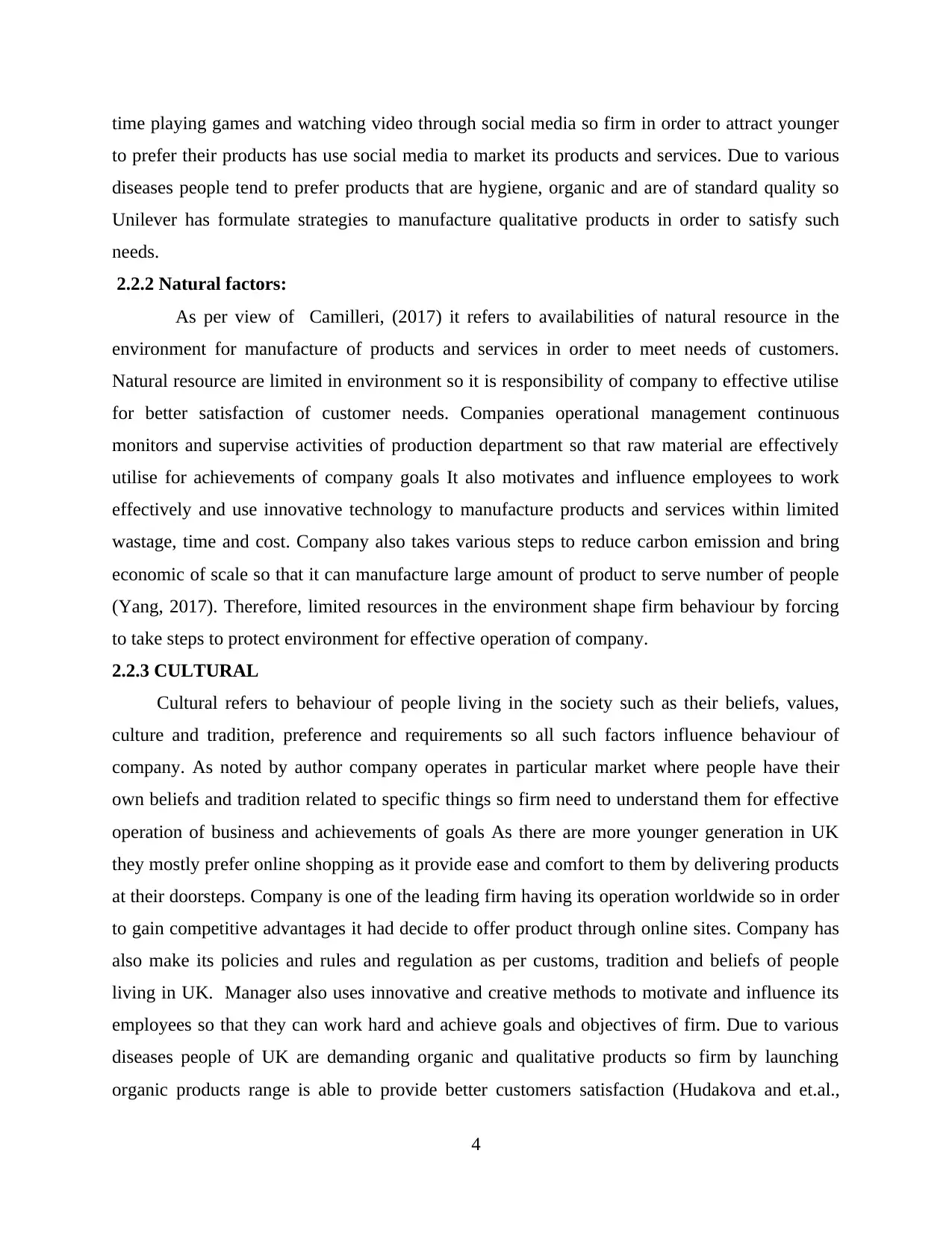
time playing games and watching video through social media so firm in order to attract younger
to prefer their products has use social media to market its products and services. Due to various
diseases people tend to prefer products that are hygiene, organic and are of standard quality so
Unilever has formulate strategies to manufacture qualitative products in order to satisfy such
needs.
2.2.2 Natural factors:
As per view of Camilleri, (2017) it refers to availabilities of natural resource in the
environment for manufacture of products and services in order to meet needs of customers.
Natural resource are limited in environment so it is responsibility of company to effective utilise
for better satisfaction of customer needs. Companies operational management continuous
monitors and supervise activities of production department so that raw material are effectively
utilise for achievements of company goals It also motivates and influence employees to work
effectively and use innovative technology to manufacture products and services within limited
wastage, time and cost. Company also takes various steps to reduce carbon emission and bring
economic of scale so that it can manufacture large amount of product to serve number of people
(Yang, 2017). Therefore, limited resources in the environment shape firm behaviour by forcing
to take steps to protect environment for effective operation of company.
2.2.3 CULTURAL
Cultural refers to behaviour of people living in the society such as their beliefs, values,
culture and tradition, preference and requirements so all such factors influence behaviour of
company. As noted by author company operates in particular market where people have their
own beliefs and tradition related to specific things so firm need to understand them for effective
operation of business and achievements of goals As there are more younger generation in UK
they mostly prefer online shopping as it provide ease and comfort to them by delivering products
at their doorsteps. Company is one of the leading firm having its operation worldwide so in order
to gain competitive advantages it had decide to offer product through online sites. Company has
also make its policies and rules and regulation as per customs, tradition and beliefs of people
living in UK. Manager also uses innovative and creative methods to motivate and influence its
employees so that they can work hard and achieve goals and objectives of firm. Due to various
diseases people of UK are demanding organic and qualitative products so firm by launching
organic products range is able to provide better customers satisfaction (Hudakova and et.al.,
4
to prefer their products has use social media to market its products and services. Due to various
diseases people tend to prefer products that are hygiene, organic and are of standard quality so
Unilever has formulate strategies to manufacture qualitative products in order to satisfy such
needs.
2.2.2 Natural factors:
As per view of Camilleri, (2017) it refers to availabilities of natural resource in the
environment for manufacture of products and services in order to meet needs of customers.
Natural resource are limited in environment so it is responsibility of company to effective utilise
for better satisfaction of customer needs. Companies operational management continuous
monitors and supervise activities of production department so that raw material are effectively
utilise for achievements of company goals It also motivates and influence employees to work
effectively and use innovative technology to manufacture products and services within limited
wastage, time and cost. Company also takes various steps to reduce carbon emission and bring
economic of scale so that it can manufacture large amount of product to serve number of people
(Yang, 2017). Therefore, limited resources in the environment shape firm behaviour by forcing
to take steps to protect environment for effective operation of company.
2.2.3 CULTURAL
Cultural refers to behaviour of people living in the society such as their beliefs, values,
culture and tradition, preference and requirements so all such factors influence behaviour of
company. As noted by author company operates in particular market where people have their
own beliefs and tradition related to specific things so firm need to understand them for effective
operation of business and achievements of goals As there are more younger generation in UK
they mostly prefer online shopping as it provide ease and comfort to them by delivering products
at their doorsteps. Company is one of the leading firm having its operation worldwide so in order
to gain competitive advantages it had decide to offer product through online sites. Company has
also make its policies and rules and regulation as per customs, tradition and beliefs of people
living in UK. Manager also uses innovative and creative methods to motivate and influence its
employees so that they can work hard and achieve goals and objectives of firm. Due to various
diseases people of UK are demanding organic and qualitative products so firm by launching
organic products range is able to provide better customers satisfaction (Hudakova and et.al.,
4
Paraphrase This Document
Need a fresh take? Get an instant paraphrase of this document with our AI Paraphraser
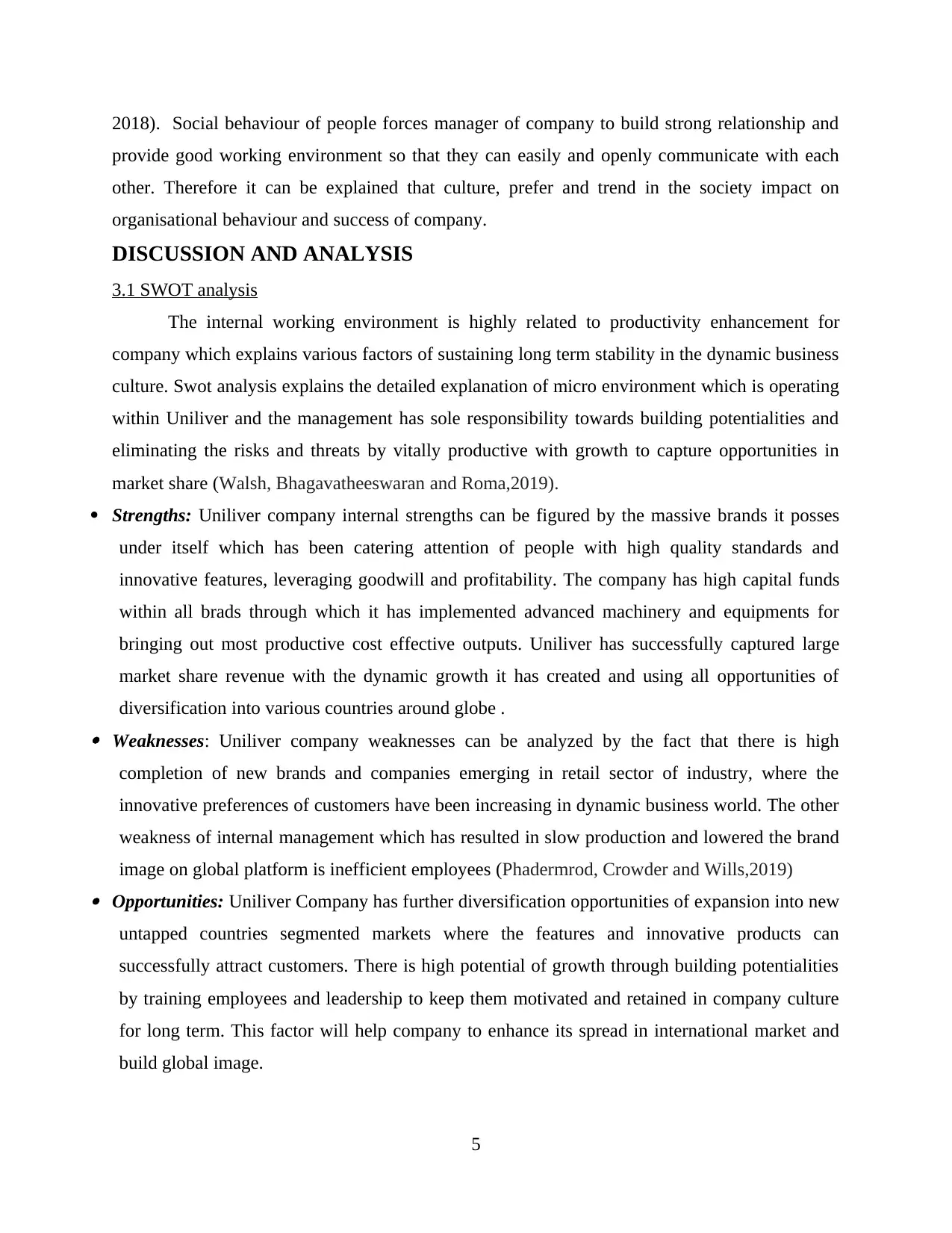
2018). Social behaviour of people forces manager of company to build strong relationship and
provide good working environment so that they can easily and openly communicate with each
other. Therefore it can be explained that culture, prefer and trend in the society impact on
organisational behaviour and success of company.
DISCUSSION AND ANALYSIS
3.1 SWOT analysis
The internal working environment is highly related to productivity enhancement for
company which explains various factors of sustaining long term stability in the dynamic business
culture. Swot analysis explains the detailed explanation of micro environment which is operating
within Uniliver and the management has sole responsibility towards building potentialities and
eliminating the risks and threats by vitally productive with growth to capture opportunities in
market share (Walsh, Bhagavatheeswaran and Roma,2019).
Strengths: Uniliver company internal strengths can be figured by the massive brands it posses
under itself which has been catering attention of people with high quality standards and
innovative features, leveraging goodwill and profitability. The company has high capital funds
within all brads through which it has implemented advanced machinery and equipments for
bringing out most productive cost effective outputs. Uniliver has successfully captured large
market share revenue with the dynamic growth it has created and using all opportunities of
diversification into various countries around globe . Weaknesses: Uniliver company weaknesses can be analyzed by the fact that there is high
completion of new brands and companies emerging in retail sector of industry, where the
innovative preferences of customers have been increasing in dynamic business world. The other
weakness of internal management which has resulted in slow production and lowered the brand
image on global platform is inefficient employees (Phadermrod, Crowder and Wills,2019) Opportunities: Uniliver Company has further diversification opportunities of expansion into new
untapped countries segmented markets where the features and innovative products can
successfully attract customers. There is high potential of growth through building potentialities
by training employees and leadership to keep them motivated and retained in company culture
for long term. This factor will help company to enhance its spread in international market and
build global image.
5
provide good working environment so that they can easily and openly communicate with each
other. Therefore it can be explained that culture, prefer and trend in the society impact on
organisational behaviour and success of company.
DISCUSSION AND ANALYSIS
3.1 SWOT analysis
The internal working environment is highly related to productivity enhancement for
company which explains various factors of sustaining long term stability in the dynamic business
culture. Swot analysis explains the detailed explanation of micro environment which is operating
within Uniliver and the management has sole responsibility towards building potentialities and
eliminating the risks and threats by vitally productive with growth to capture opportunities in
market share (Walsh, Bhagavatheeswaran and Roma,2019).
Strengths: Uniliver company internal strengths can be figured by the massive brands it posses
under itself which has been catering attention of people with high quality standards and
innovative features, leveraging goodwill and profitability. The company has high capital funds
within all brads through which it has implemented advanced machinery and equipments for
bringing out most productive cost effective outputs. Uniliver has successfully captured large
market share revenue with the dynamic growth it has created and using all opportunities of
diversification into various countries around globe . Weaknesses: Uniliver company weaknesses can be analyzed by the fact that there is high
completion of new brands and companies emerging in retail sector of industry, where the
innovative preferences of customers have been increasing in dynamic business world. The other
weakness of internal management which has resulted in slow production and lowered the brand
image on global platform is inefficient employees (Phadermrod, Crowder and Wills,2019) Opportunities: Uniliver Company has further diversification opportunities of expansion into new
untapped countries segmented markets where the features and innovative products can
successfully attract customers. There is high potential of growth through building potentialities
by training employees and leadership to keep them motivated and retained in company culture
for long term. This factor will help company to enhance its spread in international market and
build global image.
5
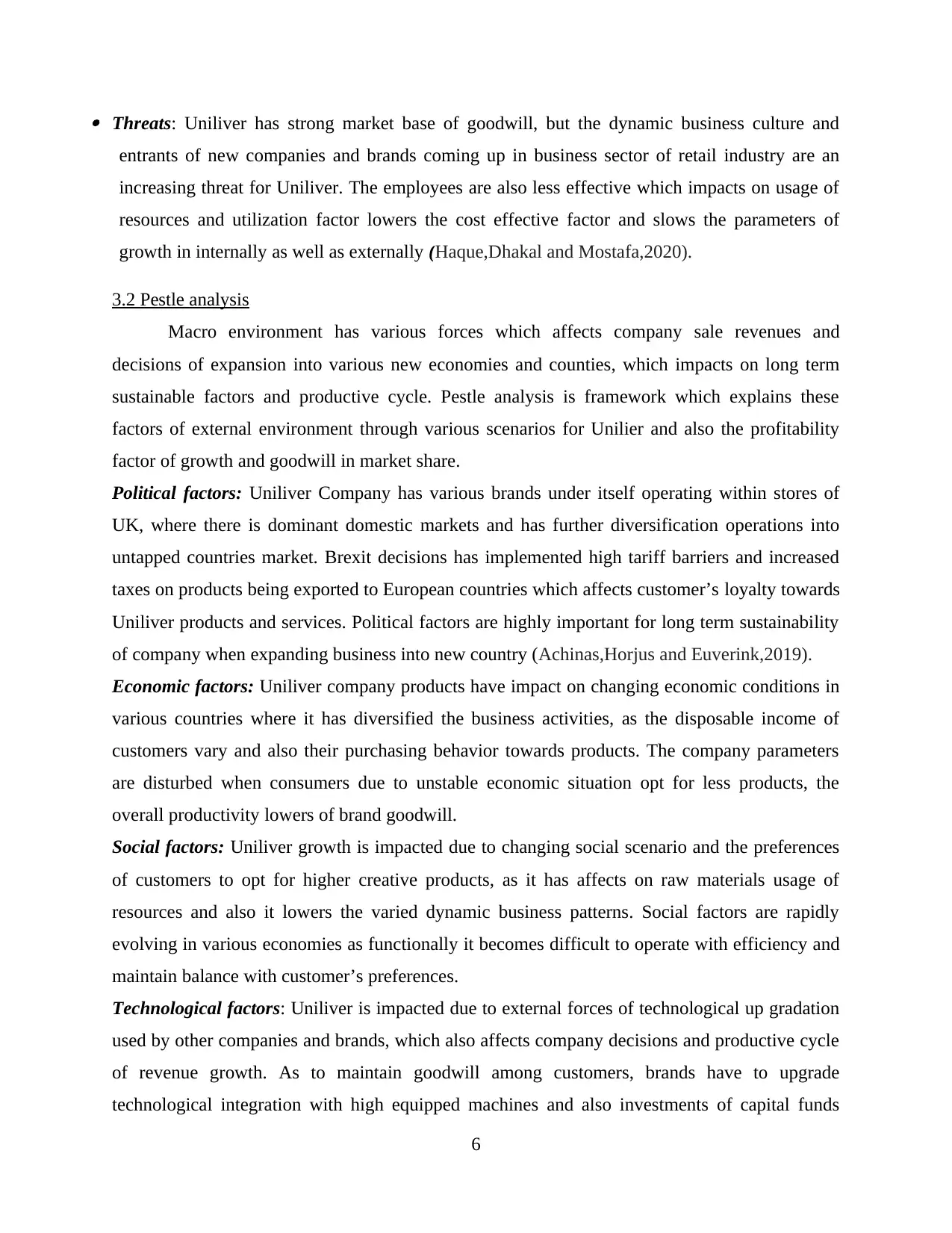
Threats: Uniliver has strong market base of goodwill, but the dynamic business culture and
entrants of new companies and brands coming up in business sector of retail industry are an
increasing threat for Uniliver. The employees are also less effective which impacts on usage of
resources and utilization factor lowers the cost effective factor and slows the parameters of
growth in internally as well as externally (Haque,Dhakal and Mostafa,2020).
3.2 Pestle analysis
Macro environment has various forces which affects company sale revenues and
decisions of expansion into various new economies and counties, which impacts on long term
sustainable factors and productive cycle. Pestle analysis is framework which explains these
factors of external environment through various scenarios for Unilier and also the profitability
factor of growth and goodwill in market share.
Political factors: Uniliver Company has various brands under itself operating within stores of
UK, where there is dominant domestic markets and has further diversification operations into
untapped countries market. Brexit decisions has implemented high tariff barriers and increased
taxes on products being exported to European countries which affects customer’s loyalty towards
Uniliver products and services. Political factors are highly important for long term sustainability
of company when expanding business into new country (Achinas,Horjus and Euverink,2019).
Economic factors: Uniliver company products have impact on changing economic conditions in
various countries where it has diversified the business activities, as the disposable income of
customers vary and also their purchasing behavior towards products. The company parameters
are disturbed when consumers due to unstable economic situation opt for less products, the
overall productivity lowers of brand goodwill.
Social factors: Uniliver growth is impacted due to changing social scenario and the preferences
of customers to opt for higher creative products, as it has affects on raw materials usage of
resources and also it lowers the varied dynamic business patterns. Social factors are rapidly
evolving in various economies as functionally it becomes difficult to operate with efficiency and
maintain balance with customer’s preferences.
Technological factors: Uniliver is impacted due to external forces of technological up gradation
used by other companies and brands, which also affects company decisions and productive cycle
of revenue growth. As to maintain goodwill among customers, brands have to upgrade
technological integration with high equipped machines and also investments of capital funds
6
entrants of new companies and brands coming up in business sector of retail industry are an
increasing threat for Uniliver. The employees are also less effective which impacts on usage of
resources and utilization factor lowers the cost effective factor and slows the parameters of
growth in internally as well as externally (Haque,Dhakal and Mostafa,2020).
3.2 Pestle analysis
Macro environment has various forces which affects company sale revenues and
decisions of expansion into various new economies and counties, which impacts on long term
sustainable factors and productive cycle. Pestle analysis is framework which explains these
factors of external environment through various scenarios for Unilier and also the profitability
factor of growth and goodwill in market share.
Political factors: Uniliver Company has various brands under itself operating within stores of
UK, where there is dominant domestic markets and has further diversification operations into
untapped countries market. Brexit decisions has implemented high tariff barriers and increased
taxes on products being exported to European countries which affects customer’s loyalty towards
Uniliver products and services. Political factors are highly important for long term sustainability
of company when expanding business into new country (Achinas,Horjus and Euverink,2019).
Economic factors: Uniliver company products have impact on changing economic conditions in
various countries where it has diversified the business activities, as the disposable income of
customers vary and also their purchasing behavior towards products. The company parameters
are disturbed when consumers due to unstable economic situation opt for less products, the
overall productivity lowers of brand goodwill.
Social factors: Uniliver growth is impacted due to changing social scenario and the preferences
of customers to opt for higher creative products, as it has affects on raw materials usage of
resources and also it lowers the varied dynamic business patterns. Social factors are rapidly
evolving in various economies as functionally it becomes difficult to operate with efficiency and
maintain balance with customer’s preferences.
Technological factors: Uniliver is impacted due to external forces of technological up gradation
used by other companies and brands, which also affects company decisions and productive cycle
of revenue growth. As to maintain goodwill among customers, brands have to upgrade
technological integration with high equipped machines and also investments of capital funds
6
⊘ This is a preview!⊘
Do you want full access?
Subscribe today to unlock all pages.

Trusted by 1+ million students worldwide
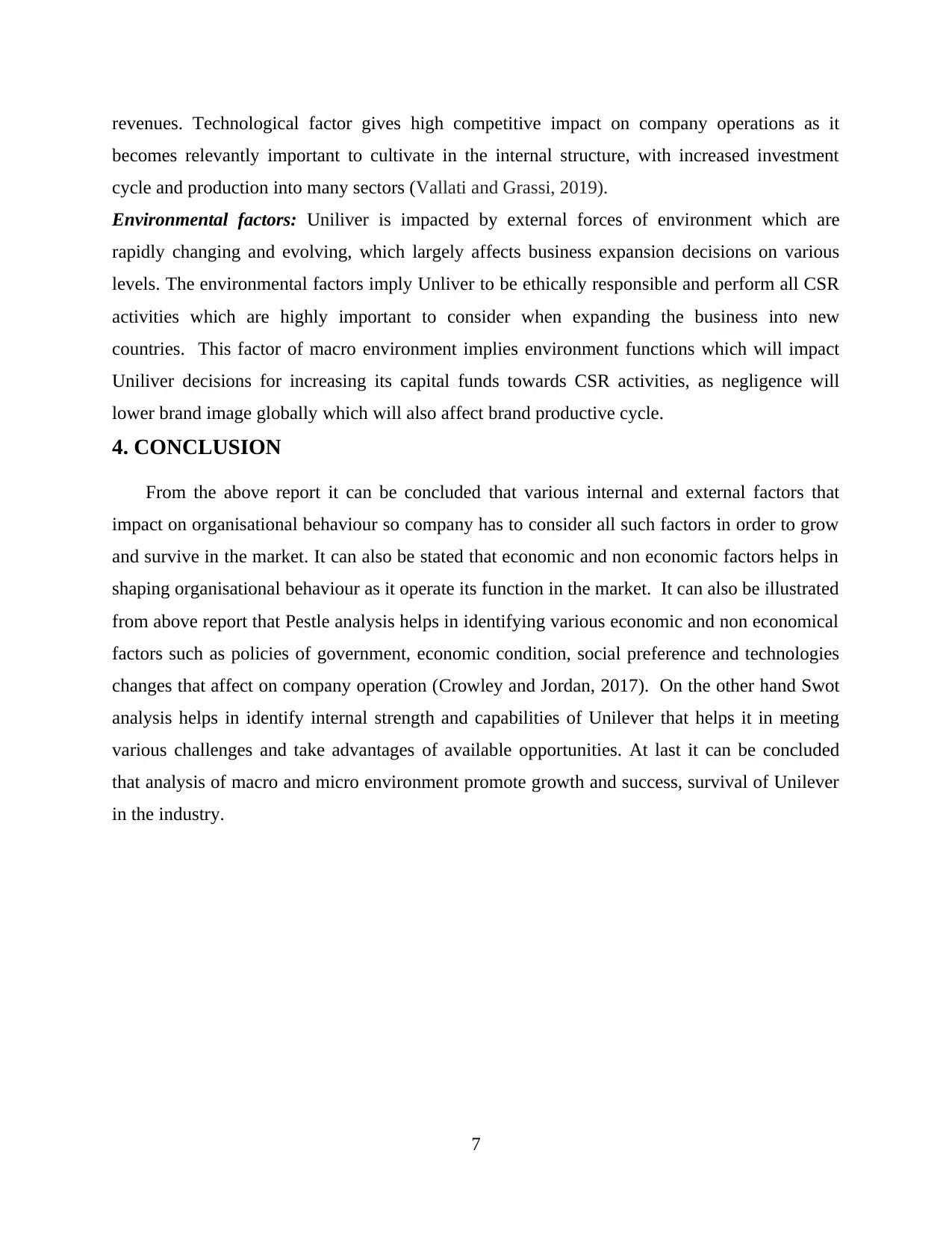
revenues. Technological factor gives high competitive impact on company operations as it
becomes relevantly important to cultivate in the internal structure, with increased investment
cycle and production into many sectors (Vallati and Grassi, 2019).
Environmental factors: Uniliver is impacted by external forces of environment which are
rapidly changing and evolving, which largely affects business expansion decisions on various
levels. The environmental factors imply Unliver to be ethically responsible and perform all CSR
activities which are highly important to consider when expanding the business into new
countries. This factor of macro environment implies environment functions which will impact
Uniliver decisions for increasing its capital funds towards CSR activities, as negligence will
lower brand image globally which will also affect brand productive cycle.
4. CONCLUSION
From the above report it can be concluded that various internal and external factors that
impact on organisational behaviour so company has to consider all such factors in order to grow
and survive in the market. It can also be stated that economic and non economic factors helps in
shaping organisational behaviour as it operate its function in the market. It can also be illustrated
from above report that Pestle analysis helps in identifying various economic and non economical
factors such as policies of government, economic condition, social preference and technologies
changes that affect on company operation (Crowley and Jordan, 2017). On the other hand Swot
analysis helps in identify internal strength and capabilities of Unilever that helps it in meeting
various challenges and take advantages of available opportunities. At last it can be concluded
that analysis of macro and micro environment promote growth and success, survival of Unilever
in the industry.
7
becomes relevantly important to cultivate in the internal structure, with increased investment
cycle and production into many sectors (Vallati and Grassi, 2019).
Environmental factors: Uniliver is impacted by external forces of environment which are
rapidly changing and evolving, which largely affects business expansion decisions on various
levels. The environmental factors imply Unliver to be ethically responsible and perform all CSR
activities which are highly important to consider when expanding the business into new
countries. This factor of macro environment implies environment functions which will impact
Uniliver decisions for increasing its capital funds towards CSR activities, as negligence will
lower brand image globally which will also affect brand productive cycle.
4. CONCLUSION
From the above report it can be concluded that various internal and external factors that
impact on organisational behaviour so company has to consider all such factors in order to grow
and survive in the market. It can also be stated that economic and non economic factors helps in
shaping organisational behaviour as it operate its function in the market. It can also be illustrated
from above report that Pestle analysis helps in identifying various economic and non economical
factors such as policies of government, economic condition, social preference and technologies
changes that affect on company operation (Crowley and Jordan, 2017). On the other hand Swot
analysis helps in identify internal strength and capabilities of Unilever that helps it in meeting
various challenges and take advantages of available opportunities. At last it can be concluded
that analysis of macro and micro environment promote growth and success, survival of Unilever
in the industry.
7
Paraphrase This Document
Need a fresh take? Get an instant paraphrase of this document with our AI Paraphraser
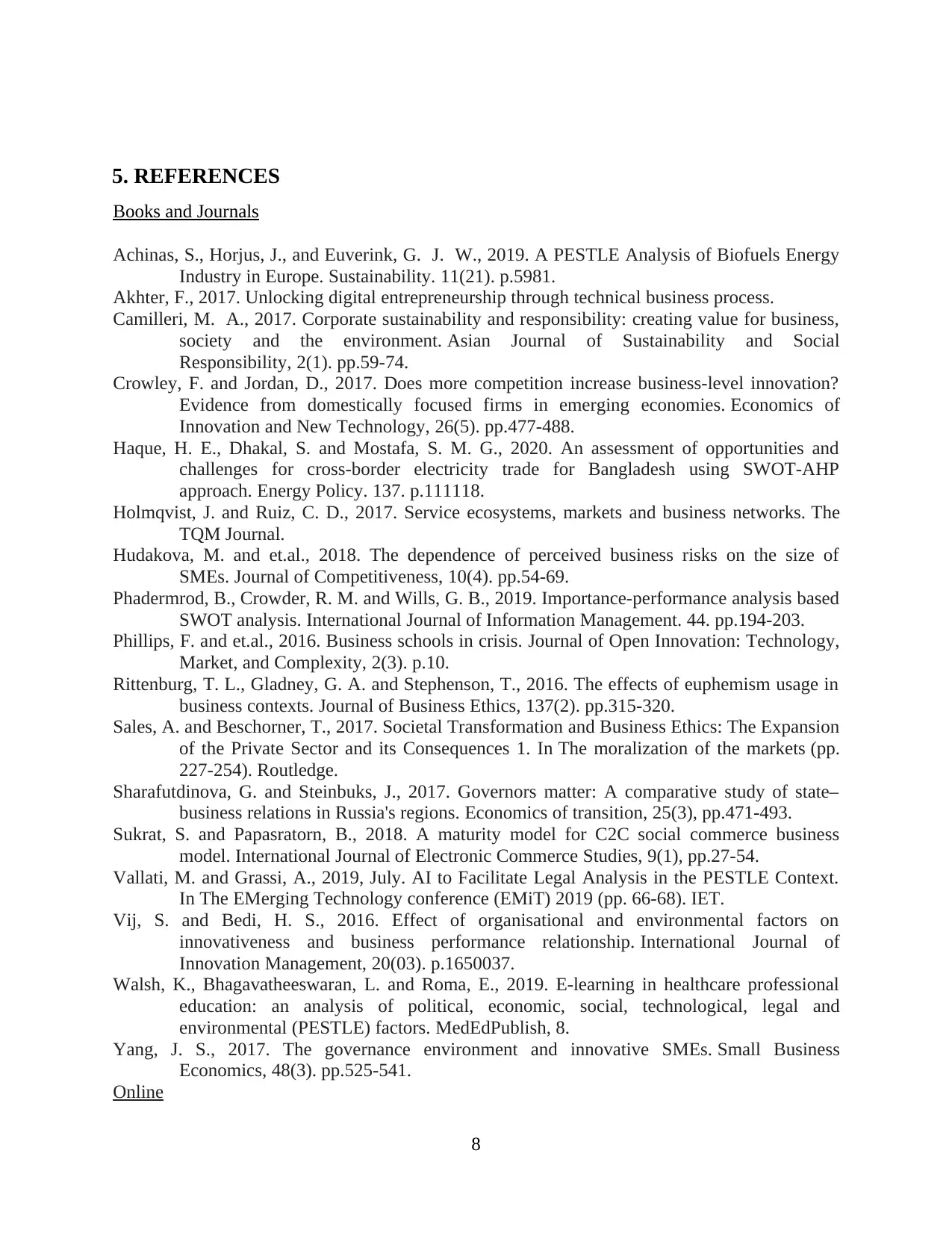
5. REFERENCES
Books and Journals
Achinas, S., Horjus, J., and Euverink, G. J. W., 2019. A PESTLE Analysis of Biofuels Energy
Industry in Europe. Sustainability. 11(21). p.5981.
Akhter, F., 2017. Unlocking digital entrepreneurship through technical business process.
Camilleri, M. A., 2017. Corporate sustainability and responsibility: creating value for business,
society and the environment. Asian Journal of Sustainability and Social
Responsibility, 2(1). pp.59-74.
Crowley, F. and Jordan, D., 2017. Does more competition increase business-level innovation?
Evidence from domestically focused firms in emerging economies. Economics of
Innovation and New Technology, 26(5). pp.477-488.
Haque, H. E., Dhakal, S. and Mostafa, S. M. G., 2020. An assessment of opportunities and
challenges for cross-border electricity trade for Bangladesh using SWOT-AHP
approach. Energy Policy. 137. p.111118.
Holmqvist, J. and Ruiz, C. D., 2017. Service ecosystems, markets and business networks. The
TQM Journal.
Hudakova, M. and et.al., 2018. The dependence of perceived business risks on the size of
SMEs. Journal of Competitiveness, 10(4). pp.54-69.
Phadermrod, B., Crowder, R. M. and Wills, G. B., 2019. Importance-performance analysis based
SWOT analysis. International Journal of Information Management. 44. pp.194-203.
Phillips, F. and et.al., 2016. Business schools in crisis. Journal of Open Innovation: Technology,
Market, and Complexity, 2(3). p.10.
Rittenburg, T. L., Gladney, G. A. and Stephenson, T., 2016. The effects of euphemism usage in
business contexts. Journal of Business Ethics, 137(2). pp.315-320.
Sales, A. and Beschorner, T., 2017. Societal Transformation and Business Ethics: The Expansion
of the Private Sector and its Consequences 1. In The moralization of the markets (pp.
227-254). Routledge.
Sharafutdinova, G. and Steinbuks, J., 2017. Governors matter: A comparative study of state–
business relations in Russia's regions. Economics of transition, 25(3), pp.471-493.
Sukrat, S. and Papasratorn, B., 2018. A maturity model for C2C social commerce business
model. International Journal of Electronic Commerce Studies, 9(1), pp.27-54.
Vallati, M. and Grassi, A., 2019, July. AI to Facilitate Legal Analysis in the PESTLE Context.
In The EMerging Technology conference (EMiT) 2019 (pp. 66-68). IET.
Vij, S. and Bedi, H. S., 2016. Effect of organisational and environmental factors on
innovativeness and business performance relationship. International Journal of
Innovation Management, 20(03). p.1650037.
Walsh, K., Bhagavatheeswaran, L. and Roma, E., 2019. E-learning in healthcare professional
education: an analysis of political, economic, social, technological, legal and
environmental (PESTLE) factors. MedEdPublish, 8.
Yang, J. S., 2017. The governance environment and innovative SMEs. Small Business
Economics, 48(3). pp.525-541.
Online
8
Books and Journals
Achinas, S., Horjus, J., and Euverink, G. J. W., 2019. A PESTLE Analysis of Biofuels Energy
Industry in Europe. Sustainability. 11(21). p.5981.
Akhter, F., 2017. Unlocking digital entrepreneurship through technical business process.
Camilleri, M. A., 2017. Corporate sustainability and responsibility: creating value for business,
society and the environment. Asian Journal of Sustainability and Social
Responsibility, 2(1). pp.59-74.
Crowley, F. and Jordan, D., 2017. Does more competition increase business-level innovation?
Evidence from domestically focused firms in emerging economies. Economics of
Innovation and New Technology, 26(5). pp.477-488.
Haque, H. E., Dhakal, S. and Mostafa, S. M. G., 2020. An assessment of opportunities and
challenges for cross-border electricity trade for Bangladesh using SWOT-AHP
approach. Energy Policy. 137. p.111118.
Holmqvist, J. and Ruiz, C. D., 2017. Service ecosystems, markets and business networks. The
TQM Journal.
Hudakova, M. and et.al., 2018. The dependence of perceived business risks on the size of
SMEs. Journal of Competitiveness, 10(4). pp.54-69.
Phadermrod, B., Crowder, R. M. and Wills, G. B., 2019. Importance-performance analysis based
SWOT analysis. International Journal of Information Management. 44. pp.194-203.
Phillips, F. and et.al., 2016. Business schools in crisis. Journal of Open Innovation: Technology,
Market, and Complexity, 2(3). p.10.
Rittenburg, T. L., Gladney, G. A. and Stephenson, T., 2016. The effects of euphemism usage in
business contexts. Journal of Business Ethics, 137(2). pp.315-320.
Sales, A. and Beschorner, T., 2017. Societal Transformation and Business Ethics: The Expansion
of the Private Sector and its Consequences 1. In The moralization of the markets (pp.
227-254). Routledge.
Sharafutdinova, G. and Steinbuks, J., 2017. Governors matter: A comparative study of state–
business relations in Russia's regions. Economics of transition, 25(3), pp.471-493.
Sukrat, S. and Papasratorn, B., 2018. A maturity model for C2C social commerce business
model. International Journal of Electronic Commerce Studies, 9(1), pp.27-54.
Vallati, M. and Grassi, A., 2019, July. AI to Facilitate Legal Analysis in the PESTLE Context.
In The EMerging Technology conference (EMiT) 2019 (pp. 66-68). IET.
Vij, S. and Bedi, H. S., 2016. Effect of organisational and environmental factors on
innovativeness and business performance relationship. International Journal of
Innovation Management, 20(03). p.1650037.
Walsh, K., Bhagavatheeswaran, L. and Roma, E., 2019. E-learning in healthcare professional
education: an analysis of political, economic, social, technological, legal and
environmental (PESTLE) factors. MedEdPublish, 8.
Yang, J. S., 2017. The governance environment and innovative SMEs. Small Business
Economics, 48(3). pp.525-541.
Online
8
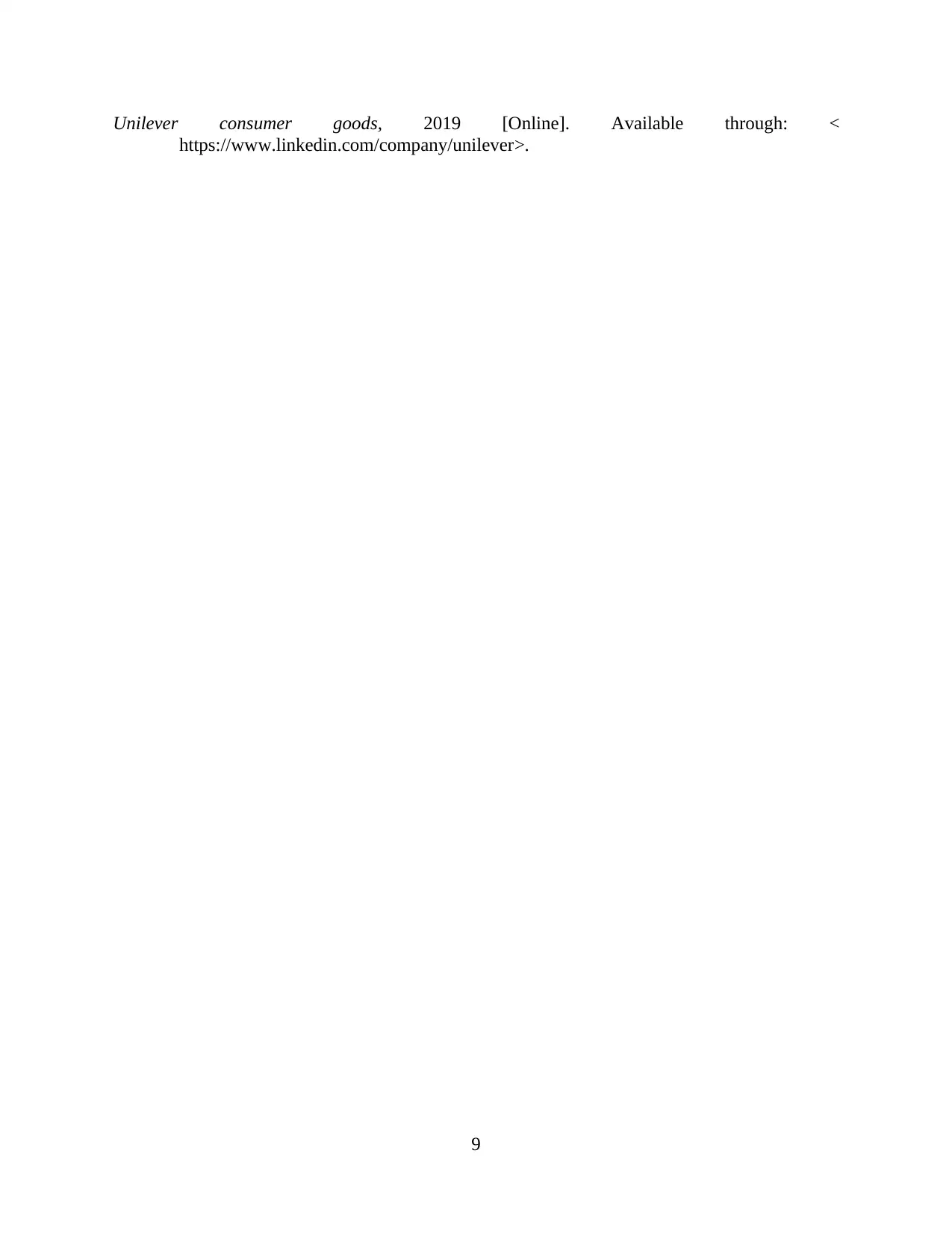
Unilever consumer goods, 2019 [Online]. Available through: <
https://www.linkedin.com/company/unilever>.
9
https://www.linkedin.com/company/unilever>.
9
⊘ This is a preview!⊘
Do you want full access?
Subscribe today to unlock all pages.

Trusted by 1+ million students worldwide
1 out of 12
Related Documents
Your All-in-One AI-Powered Toolkit for Academic Success.
+13062052269
info@desklib.com
Available 24*7 on WhatsApp / Email
![[object Object]](/_next/static/media/star-bottom.7253800d.svg)
Unlock your academic potential
Copyright © 2020–2026 A2Z Services. All Rights Reserved. Developed and managed by ZUCOL.




